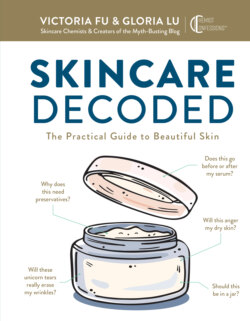Читать книгу Skincare Decoded - Victoria Fu - Страница 49
На сайте Литреса книга снята с продажи.
ОглавлениеSKINCARE DECODED • 54 MOISTURIZERS • 55
to dull skin, smooth skin surface, and improve overall skin pliancy. While
oils are lousy stand-alone moisturizers, there are a few key scenarios where a
face oil can really elevate your skin routine.
FACE-OIL-TO-THE-RESCUE SCENARIOS
Consider a face oil for the following scenarios:
“I love my moisturizer, but my skin still gets a little dry.” Skin constantly
changes. Just from stress, age, lifestyle, and hormones, your moisturizing
requirements can really fluctuate. If you’re loyal to your moisturizer and know
your skin needs just a little help in the moisturizing department, consider
adding a couple of drops of face oil to give it that oomph.
“I’m dry, but not petrolatum/balm (cactus) dry.” We get it—petrolatum and
other heavy-duty occlusives feel kind of gross. Not to mention the disco-ball-
shiny look is so not in right now. Consider face oils, their lighter (albeit less
effective) cousins.
“My skin is a little dull.” A quick way to add back that healthy glow to skin is
with a couple of drops of face oil.
“I have acne, but my acne topicals are drying me out, and my current
moisturizer isn’t cutting it.” Look for a lightweight emollient such as linoleic,
acid–forward plant oils or squalane.
Representative Emollient-Forward Product Face oils
New to oils? Consider squalane
Before you try to figure out if you need rose hip, watermelon seed, argan, or whichever plant
oil, consider squalane, which is a purely saturated hydrocarbon. In laypersonʼs terms, this
means that it’s super vanilla and is highly unlikely to irritate you or cause you to break out. It’s
a great starting point for beginners of all skin types.
